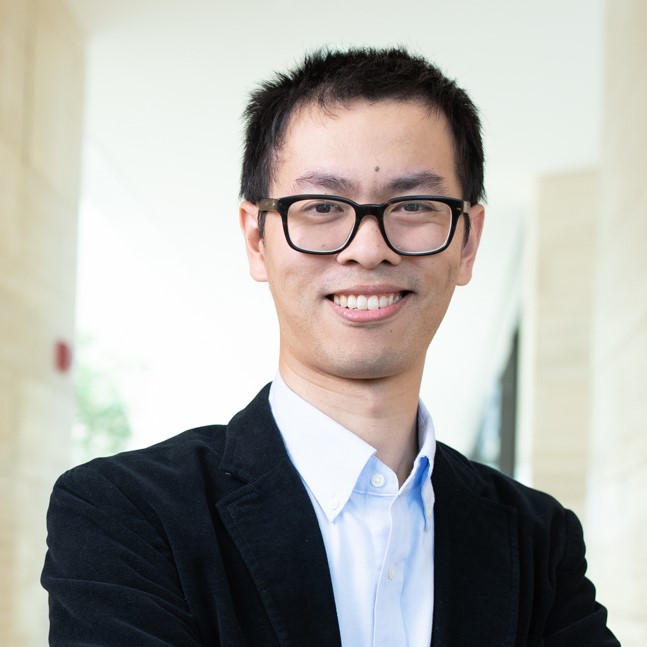by Buck Institute
June 20, 2023 . BLOG
Scientist Spotlight: Kai Zhou, PhD
 Assistant Professor Chuankai (Kai) Zhou, PhD, became fascinated with the mysteries of aging when he was still quite young. His curiosity began with some nature collecting.
Assistant Professor Chuankai (Kai) Zhou, PhD, became fascinated with the mysteries of aging when he was still quite young. His curiosity began with some nature collecting.
Growing up in a small village on the east coast of China, Zhou spent his childhood gathering anything in nature he could get his hands on, such as plants, insects, fruits and leaves. “I collected all of these things as a kid, but never really thought about what's inside them,” he says. That all changed one day in middle school, when he was drawn to a biology textbook in a bookstore.
“I spent half a day reading that book, which was really eye-opening!” he says. “That book made me realize all the cool things I couldn’t see, such as the structure inside of a tree and how photosynthesis works. That was the beginning of my passion for biology.”
In high school, his interest further developed, and he chose to major in biology at Peking University, the most prestigious in China. He thought he was going to pursue cancer research until a pivotal conversation during his senior year.
As Zhou and his closest friend were talking about what they were going to do after they graduated, they touched on the concept of aging. “People take it for granted that aging is a natural process,” he says. “But we started to wonder why it happens and we both developed a strong interest in researching this question.” They realized that while there was a lot of information published on the topic, it wasn’t taught in college alongside the traditional subjects of cell biology, microbiology, and genetics.
“Just like when I was a kid, when I took for granted all these specimens I collected, never asking about what is inside or how they work,” he says, once again he was captivated by wonder, this time with how and why aging occurs. “My interest in aging is very hardcore, and it has never changed since that conversation 14 years ago.”
The discussion with his friend refocused Zhou’s choice of graduate studies (and his friend’s, who also ended up studying aging). Zhou only applied to programs that included research on the biology of aging. He ended up returning to a laboratory where he had interned one summer, at the University of Kansas School of Medicine and the Stowers Institute for Medical Research in Kansas City, Missouri. His principal investigator there primarily studied cell division, but was interested in how that is connected to aging, says Zhou. “It was a new direction for the lab, and I was given a lot of freedom to explore,” he says. He quickly published his first research article in the journal Cell during his first year in graduate school, and had several other high-profile publications as a graduate student.
The success of his graduate studies enabled Zhou to skip traditional postdoctoral training to become the first Buck Fellow. In 2017, he received a $2.4 million Early Independence Award from the National Institutes of Health, part of the high-risk/high-reward program of NIH, and he is now on the tenure track for professorship.
“This is the beginning of my career, and I keep asking myself, what would be a good achievement that I will be proud of, after 30 or 40 years,” he says. “One of my ultimate interests is how can we slow down or reverse aging, or rejuvenation. No one knows yet how to regulate rejuvenation; it is a new frontier.”
As a cell biologist, instead of looking at one organelle or molecule, Zhou sees the entirety of the cell as an intricate, dynamic system in which any of its many parts may cease to work properly during aging.
Zhou’s lab primarily uses yeast and cultured human cells to reveal the communications and interactions occurring within cells. These cellular models allow the research team to use multiple cutting-edge methods to systematically monitor cellular responses to stress, aging and proteins related to neurodegenerative conditions, especially Alzheimer’s disease.
“If we know the big picture of step-by-step what changes a young cell into an aged one, then we probably can engineer combinations of interventions that will be logically designed, and also very effective at slowing down or reversing aging,” he says.
The ultimate question he hopes to answer is the same one that excited him as a college student: Why do we get old and what can we do about it? “That's definitely still where my heart is,” he says. “And I think I'm fortunate enough to be able to keep exploring that direction, to really understand the molecular mysteries of aging.”

SHARE